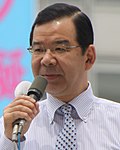Japanese general election, 2014
Japanese general election, 2014

|
|
|
|
|
All 475 seats to the House of Representatives of Japan
238 seats needed for a majority
|
| Turnout |
52.66% |
| |
First party |
Second party |
Third party |
| |
 |
 |
 |
| Leader |
Shinzō Abe |
Banri Kaieda |
Kenji Eda |
| Party |
Liberal Democratic |
Democratic |
Innovation |
| Leader since |
26 September 2012 |
25 December 2012 |
21 September 2014 |
| Leader's seat |
Yamaguchi-4th |
Tokyo-1st (lost)
Tokyo PR (lost) |
Kanagawa-8th |
| Last election |
294 seats
43.02% (district)
27.62% (block)
|
57 seats
22.81% (district)
15.49% (block)
|
New |
| Seats before |
294 |
62 |
42 |
| Seats won |
291 |
73 |
41 |
| Seat change |
 3 3 |
 11 11 |
 1 1 |
| Popular vote |
25,461,427 (district)
17,658,916 (block) |
11,916,838 (district)
9,775,991 (block)
|
4,319,645 (district)
8,382,699 (block)
|
| Percentage |
48.1% (district)
33.11% (block) |
22.5% (district)
18.33% (block)
|
8.2% (district)
15.72% (block)
|
|
| |
Fourth party |
Fifth party |
Sixth party |
| |
 |
 |
 |
| Leader |
Natsuo Yamaguchi |
Kazuo Shii |
Takeo Hiranuma |
| Party |
Komeito |
Communist |
Future Generations |
| Leader since |
8 September 2009 |
24 November 2000 |
1 August 2014 |
| Leader's seat |
not contesting (Coun.) |
Minami-Kantō PR |
Okayama-3rd |
| Last election |
31 seats
1.49% (district)
11.83% (block)
|
8 seats
7.88% (district)
6.13% (block)
|
New |
| Seats before |
31 |
8 |
20 |
| Seats won |
35 |
21 |
2 |
| Seat change |
 4 4 |
 13 13 |
 18 18 |
| Popular vote |
765,390 (district)
7,314,236 (block)
|
7,040,130 (district)
6,062,962 (block)
|
947,395 (district)
1,414,919 (block)
|
| Percentage |
1.5% (district)
13.71% (block)
|
13.3% (district)
11.37% (block)
|
1.8% (district)
2.65% (block)
|
|
| |
Seventh party |
Eighth party |
| |
SDP |
 |
| Leader |
Tadatomo Yoshida |
Ichiro Ozawa |
| Party |
Social Democratic |
People's Life |
| Leader since |
14 October 2013 |
25 January 2013 |
| Leader's seat |
not contesting (Coun.) |
Iwate-4th |
| Last election |
2 seats
0.76% (district)
2.36% (block)
|
New |
| Seats before |
2 |
5 |
| Seats won |
2 |
2 |
| Seat change |
 0 0 |
New |
| Popular vote |
419,347 (district)
1,314,441 (block)
|
514,575 (district)
1,028,721 (block)
|
| Percentage |
0.8% (district)
2.46% (block)
|
1.0% (district)
1.93% (block)
|
|

|
|
Shinzō Abe
Liberal Democratic
Shinzō Abe
Liberal Democratic
The 47th general election of members of the House of Representatives (第47回衆議院議員総選挙, dai-yonjūnanakai Shūgiin giin sōsenkyo?) of Japan was held on 14 December 2014. Voting took place in all Representatives constituencies of Japan including proportional blocks, in order to appoint Members of Diet to seats in the House of Representatives, the lower house of the National Diet of Japan. As the cabinet resigns in the first post-election Diet session after a general House of Representatives election (Constitution, Article 70), the lower house election also led to a new designation election of the prime minister in the Diet (Shinzo Abe was reappointed), and the appointment of a new cabinet (with some ministers re-appointed).
In 2012, the Democratic Party of Japan government under Yoshihiko Noda decided to implement a raise of the Japanese consumption tax. Following this move, the Liberal Democratic Party under Shinzo Abe regained control of the Japanese government in the December 2012 general election. Abe proceeded to implement a series of economic programs known as "Abenomics" in a bid to stimulate the economy. Despite these programs, Japan entered a technical recession in mid-2014, which Abe blamed on the consumption tax hike, even though many members of the LDP supported the hike. Abe called a snap election on November 18, in part for the purpose of winning LDP backing to postpone the hike and pursue the Abenomics package.
...
Wikipedia








